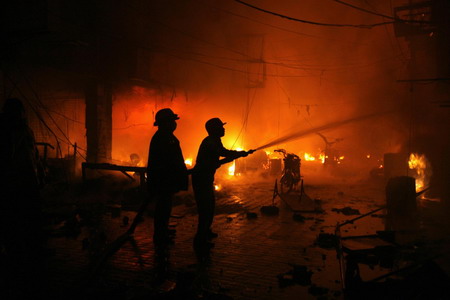Asia-Pacific
Police: Bomb near Pakistan intel office kills 12
(Agencies)
Updated: 2009-12-08 17:24
|
|
MULTAN, Pakistan: A bomb exploded near an intelligence office in central Pakistan on Tuesday, authorities said, damaging the building and killing at least 12 people amid a surge of extremist violence that has prompted the US to offer additional aid in the country's battle against the Taliban and al-Qaida.
The bombing in Multan signaled a relentless determination on the part of the militants, who -- despite being pressured by a major army offensive in one of their Afghan border havens -- have sustained a retaliatory campaign since October that has killed more than 400 people. On Monday, bombings elsewhere in the country killed 59 people.
The apparent target of the blast was a building housing an office of Pakistan's most powerful spy agency, Inter-Services Intelligence. Authorities still had not determined how the attack was carried out.
Rizwan Naseer, the official in charge of the area's government-run emergency service, told a Pakistani news channel that the attack killed 12 people and wounded 30 people. It was not immediately clear how many were intelligence agents.
The attack came as US Defense Secretary Robert Gates said Washington was ready to work more closely with Pakistan as soon as Islamabad expressed willingness.
"The more they get attacked internally ... the more open they may be" to help from the United States," Gates said during a trip to Afghanistan. "But we are prepared to expand that relationship at any pace they are prepared to accept."
Early Tuesday, suspected US missiles struck a car carrying three people in the Taliban-riddled North Waziristan tribal region, two intelligence officials said. The region neighbors South Waziristan, the focus of the latest Pakistani army offensive, and is believed to be where many of the Taliban have fled to avoid the military onslaught. The identities of the three were not immediately clear.
All the intelligence officials spoke on condition of anonymity because they were not authorized to speak to the media.
Most of the militant attacks in recent weeks have been directed at security forces, though several have targeted crowded public spaces such as markets, apparently to create public anger and increase pressure on the government to call a halt to the South Waziristan offensive.
The Taliban generally claim responsibility for attacks on security officers, but not those that kill civilians, though they -- or affiliated extremist groups -- are suspected in all the strikes.
Late Monday, twin blasts and a resulting fire ripped through the Moon Market, a center in the eastern city of Lahore that is popular with women and sells clothing, shoes and cosmetics. Lahore police chief Pervaiz Lathore said Tuesday that the death toll in the blasts had reached 49, with more than 100 people wounded.












